Prostate cancer is the second most common type of prostate cancer among men in Brazil, According to data from the National Cancer Institute (Inca). It is estimated that in 2022 alone, the disease will cause 65,000 new cases.
Early diagnosis of prostate cancer is essential to increase the life expectancy of the patient. The disease is considered multifactorial, which means that a combination of genetic factors and acquired habits participate in the emergence of this tumor.
Prostate cancer usually has a high chance of cure if diagnosed early. Depending on the stage of the disease, treatment may include surgery to remove the tumor and radiation therapy. For more advanced cases, hormonal therapy can be combined, ”explains oncologist Igor Morbeck, from the Cerio Lebanon Hospital in Brasilia.
Brazilian Society of Clinical Oncology (SBOC) I collected the main doubts heard in medical offices to help spread correct information about the disease. paying off:
Myths and facts about prostate cancer
1. Prostate cancer only appears in older men
fable – Although it is more common in old age, the disease can affect young people as well. Therefore, men of all ages should pay attention to risk factors and symptoms. Signs such as blood in the urine or semen, painful urination, weak urethra, and a feeling of incomplete emptying of the bladder require urgent medical attention.
2. A rectal touch examination should only be performed after the age of 50
fable – Tests that help diagnose prostate cancer must follow medical guidelines that take into account each patient’s history. Tests such as PSA (prostate-specific antigen) and a rectal examination can be ordered by the doctor from the age of 45, or even earlier in some cases.
3. A digital rectal exam hurts
fable – A digital rectal exam is completely painless. The procedure is performed manually by a urologist, who uses the index finger to touch the prostate and feel if there is a growth in the organ or any change in the area. The test lasts about 15 to 20 seconds, and It has nothing to do with the patient’s sexuality🇧🇷
 3 Cards_Photo_Gallery (2)
3 Cards_Photo_Gallery (2)According to the National Cancer Institute (Inca), cancer is one of the major public health problems in the world and is one of the four leading causes of death before the age of 70 in many countries. Since it is an increasingly common problem, the sooner it is identified, the higher the chances of recovery.boonchai wedmakhand
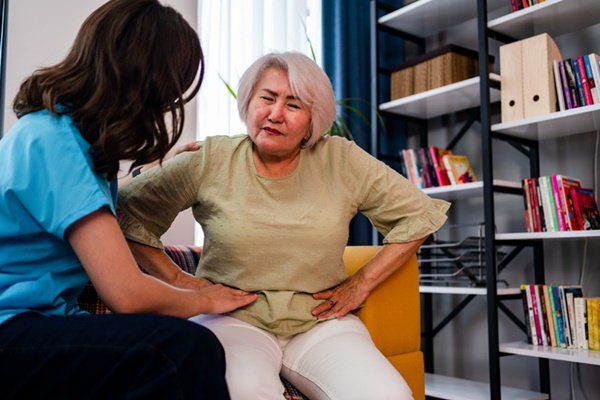 **** Portrait of a lady sitting with hands on her stomach. jpg
**** Portrait of a lady sitting with hands on her stomach. jpgTherefore, it is important to be aware of the signs that the body gives. Although some tumors do not show symptoms, cancer often causes changes in the body. Learn about some of the signs that may appear in the presence of the diseaseVenart Studio / Getty Images
 **** Photo-woman-on-a-scale.jpg
**** Photo-woman-on-a-scale.jpgWeight loss for no apparent reason can be a major symptom of various types of cancer, such as: stomach, lung, pancreas, etc.Flashpop / Getty Images
 **** Photo-person-with-hand-on-bosom-2.jpg
**** Photo-person-with-hand-on-bosom-2.jpgPersistent changes in skin texture without an apparent cause can also be a red flag, especially if the bumps and lumps are in the breasts, neck, groin, testicles, armpits, and stomach.FG Trade / Getty Images
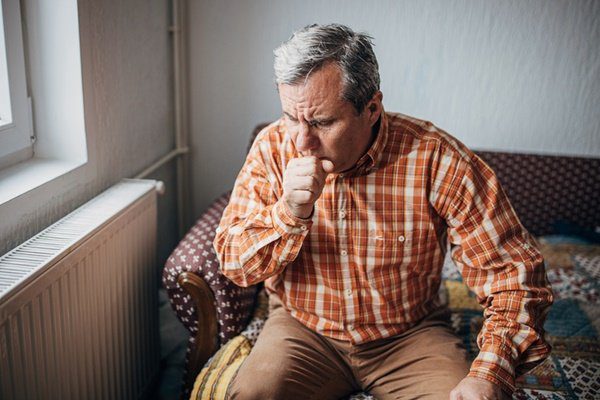 **** Photo-man-with-cough. jpg
**** Photo-man-with-cough. jpgPersistent cough, although a common symptom of many illnesses, should be investigated if it persists for more than four weeks. If it is accompanied by shortness of breath and blood, for example, it could be an indication of lung cancer.South_agency/Getty Images
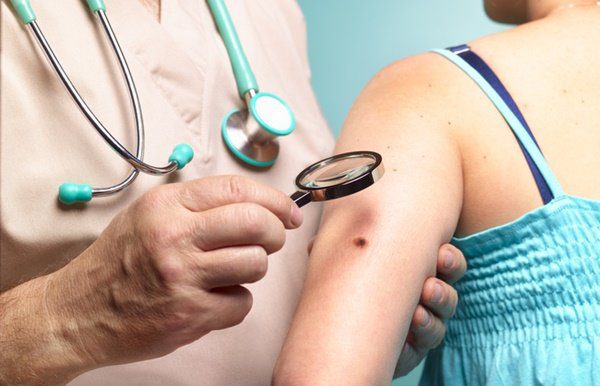 **** Photo-paint-being-Invested. jpg
**** Photo-paint-being-Invested. jpgAnother distinguishing sign of the presence of cancer is a change in the appearance of moles. Changes in size, color, and shape should also be examined, especially if they crust, bleed, or show retained fluid.Peter Dazeley / Getty Images
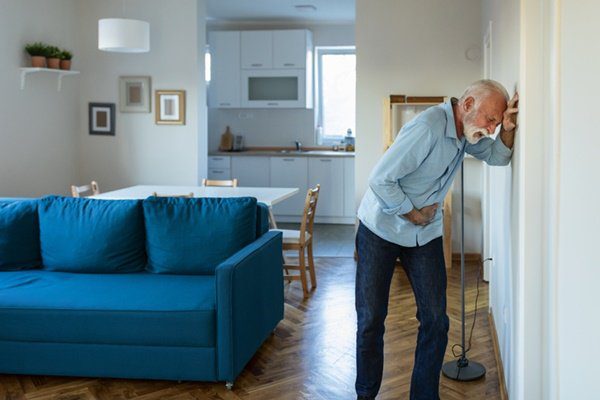 ****Photo-person-in-pain.jpg
****Photo-person-in-pain.jpgThe presence of blood in the stool or urine can be a sign of cancer of the kidneys, bladder or intestines. In addition, pain and difficulties when urinating should also be checked.RealPeopleGroup/Getty Images
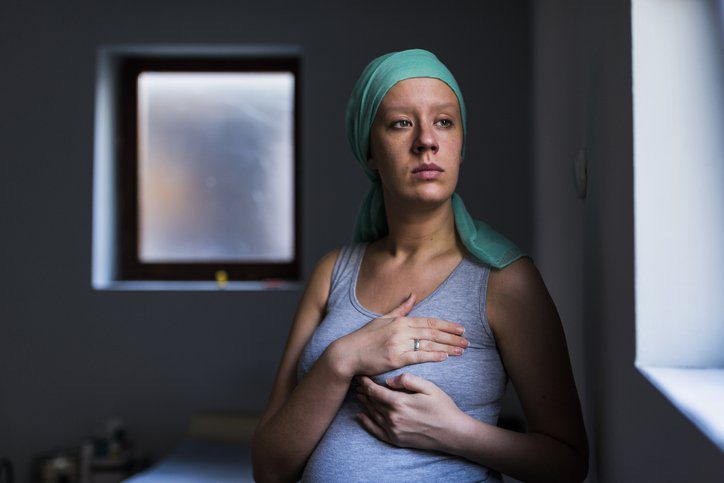 **** Photo-person-with-hand-on-bosom.jpg
**** Photo-person-with-hand-on-bosom.jpgPain without an apparent cause that lasts for more than four weeks, frequently or intermittently, may be a sign of cancer. This is because some tumors can press on bones, nerves, and other organs, causing discomfort. ljubaphoto / Getty Images
 ***** Photo-man-with-the-belly.jpg
***** Photo-man-with-the-belly.jpgStrong and frequent heartburn, which is painful and does not seem to go away, can indicate various types of diseases, such as cancer of the throat or stomach. In addition, difficulty and pain when swallowing should also be investigated, as it may be a sign of esophageal cancer.DjelicS / Getty Images
0
4. Obesity and a sedentary lifestyle are risk factors for prostate cancer
Reality – These factors are directly related to changes in metabolism, as well as excessive intake of processed foods, dyes, sugars and other seasonings. The changes can lead to mutations that give rise to cancerous cells. Maintaining a routine of physical activities and a balanced diet helps to empty the body, avoiding high levels of fat, and thus contributes to the prevention of cancer.
5. Prostate cancer has nothing to do with sexual orientation
Reality – No type of sexual relationship is a cause or protective factor for prostate cancer, whether heterosexual or homosexual. In the case of people born male, but who have undergone a sex reassignment operation, the prostate examination should be maintained, as the organ is not usually removed during a sex reassignment procedure.
6. Prostate cancer treatment causes impotence
It depends 🇧🇷 In general, after prostate cancer treatment, most men tend to maintain their sexual function on a regular basis. But in some cases, depending on the location and size of the tumor being treated, there may be some damage to the nerves that surround the prostate and control erection.
Even with small odds of dysfunction, over time and with adjunctive therapies, it is possible to restore sexual functions.
7. Vasectomy causes prostate cancer
fable – There is no risk factor or direct relationship between vasectomy and the onset of prostate cancer.
8. Prostate cancer is hereditary
It depends – aAlthough the genetic factor is associated with the onset of prostate cancer, which can double the chances of developing the tumor for those who are first-degree relatives with patients with the disease, not everyone with a family history will necessarily suffer from the disease. There are many factors that can contribute to its development, far beyond genetic predisposition.
Get news from capital Cities on your Telegram and stay on top of everything! Just access the channel: https://t.me/metropolesurgente🇧🇷

“Wannabe internet buff. Future teen idol. Hardcore zombie guru. Gamer. Avid creator. Entrepreneur. Bacon ninja.”

